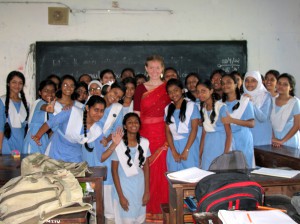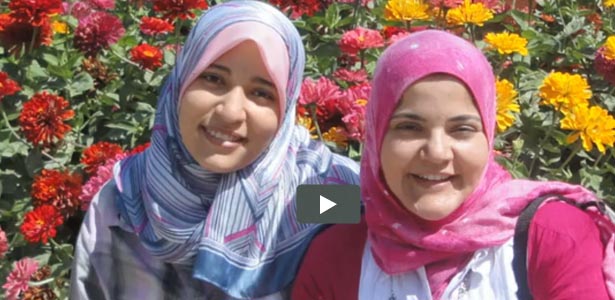
Alexa Schmidt, 2011-2012, Fulbright ETA to Bangladesh (center), with a group of her eighth grade students and after school conversational language club members
My flight leaving Bangladesh was brutal—Dhaka to Kolkata to Bangalore to Frankfurt to Philadelphia to Burlington over two and a half days. Yet, just as arriving in Bangladesh was circuitous, it seemed fitting that my departure would also be less than straightforward. Anyway, I needed the time to transition.
The reasons I gave initially to explain my application to the Fulbright English Teaching Assistant Program (ETA) to Bangladesh included my desires to live in a predominately Muslim country, to challenge myself in an environment where few people speak English, and to explore the place most opposite to what I always considered home. I believe I fulfilled all of these desires, but they pale in comparison to what I could say now: Fulbright is an exceptional program which realizes its aims in a truly transformative way. Mutual understanding has become one of my core values and I think about just about everything – from privilege, to nationalism, to sweatshops – differently now.
I was three years out of undergrad when I decided to apply, and for two of those years, I worked in the United States with refugee English Language Learners. My experience teaching English language and working in a cross-cultural setting strengthened my application, but it took time to articulate country-specificity. The key to a strong Fulbright application (whether ETA or study/research) is being able to express both your unique personal history in your personal statement and your ability to engage with your host country through a feasible and well-designed statement of grant purpose.
The Fulbright ETA grant is different from other teaching abroad opportunities. ETAs are paired with a local affiliate, where they share and learn from each other’s instructional methods. Judging by the rapid growth (70 countries are currently offered) of participating countries, this model works, but doesn’t mean that it is easy. Co-teaching is a delicate balance even when two people share similar cultural backgrounds, however, I think there are merits to students seeing different ideas in practice. My affiliate would chart grammatical rules and I would ask students to close their books, turn to their desk mates, and practice applying those rules to a given prompt. One time, I blindfolded a “reader” and instructed the writer to guide the blindfolded student around overturned desks and over benches to demonstrate how transition words lead one’s audience. It was one of the more successful activities—I failed miserably with activities sometimes, too! It was often awkward to influence the direction of a classroom of up to 80 students, but I think in the end we all benefited.
Living in Dhaka for nine months was quite possibly the most challenging and simultaneously most rewarding thing I have ever done. Fulbright is worth it. The application is one leg of a long journey, after which, your home country and your host country are never the same. I continue to work with refugee and immigrant students in the United States, but my understanding of the contexts they are coming from is much more textured as a result of my experiences in Dhaka. A few times, I’ve met a student who speaks Bengali and we switch languages, often causing the other students to wonder how I came to speak a language just two students in a school of 4,000 speak. My transition is ongoing; Bangladesh is now very much a part of who I am.




2 Comments
I was a Fulbright ETA in Turkey last year, for reasons almost identical to yours. Your post was enjoyable to read, both for the memories it evoked of my experience abroad and also of the fresh perspective from your experience abroad. I liked your blindfold idea and wish I had thought of it with my Turkish students. Good luck with your future pursuits!
Shannon,
Thanks for your comment! I’m glad that my words evoked memories and offered perspective– It sounds like there were many commonalities in our experiences!